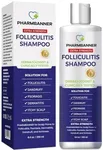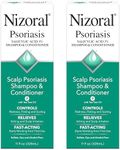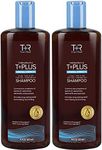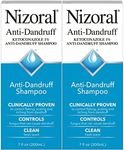Buying Guide for the Best Antifungal Shampoos
Choosing the right antifungal shampoo can be crucial for effectively treating and preventing fungal infections on the scalp. These shampoos are designed to address issues such as dandruff, seborrheic dermatitis, and other fungal-related scalp conditions. To make an informed decision, it's important to understand the key specifications and how they relate to your specific needs. Here are the main factors to consider when selecting an antifungal shampoo.Active IngredientsActive ingredients are the components in the shampoo that target and eliminate fungal infections. Common active ingredients include ketoconazole, selenium sulfide, and zinc pyrithione. Ketoconazole is known for its strong antifungal properties and is often recommended for severe cases. Selenium sulfide helps reduce itching and flaking, making it suitable for moderate conditions. Zinc pyrithione is effective for mild dandruff and scalp irritation. Choose an active ingredient based on the severity of your condition and any previous reactions to these substances.
Frequency of UseThe frequency of use refers to how often you need to apply the shampoo to achieve the desired results. Some antifungal shampoos are designed for daily use, while others are recommended for use only a few times a week. Daily use shampoos are generally milder and suitable for ongoing maintenance, while those used less frequently tend to be stronger and more effective for acute flare-ups. Consider your lifestyle and the severity of your scalp condition when deciding on the frequency of use.
Scalp SensitivityScalp sensitivity is an important factor to consider, especially if you have a history of allergic reactions or sensitive skin. Some antifungal shampoos contain additional ingredients like fragrances or preservatives that can irritate sensitive scalps. Look for shampoos labeled as hypoallergenic or formulated for sensitive skin to minimize the risk of irritation. If you have a sensitive scalp, opt for a gentler formula with fewer potential irritants.
Moisturizing PropertiesMoisturizing properties are important to prevent the scalp from becoming too dry, which can exacerbate itching and flaking. Some antifungal shampoos include moisturizing agents like aloe vera, tea tree oil, or coconut oil to help maintain scalp hydration. If you have a dry scalp or are prone to dryness, choose a shampoo with added moisturizing ingredients to keep your scalp balanced and comfortable.
ScentThe scent of the shampoo can affect your overall experience, especially if you are sensitive to strong smells. Antifungal shampoos can have medicinal or chemical odors due to their active ingredients. Some products are formulated with pleasant fragrances to mask these smells. If you are sensitive to scents or prefer a particular fragrance, look for a shampoo that meets your preference. However, be cautious of added fragrances if you have a sensitive scalp.
Brand ReputationBrand reputation can provide insight into the effectiveness and safety of the product. Established brands with positive reviews and a history of producing quality antifungal shampoos are generally more reliable. Researching customer reviews and seeking recommendations from healthcare professionals can help you choose a reputable brand. Trustworthy brands are more likely to offer products that deliver consistent results and adhere to safety standards.























